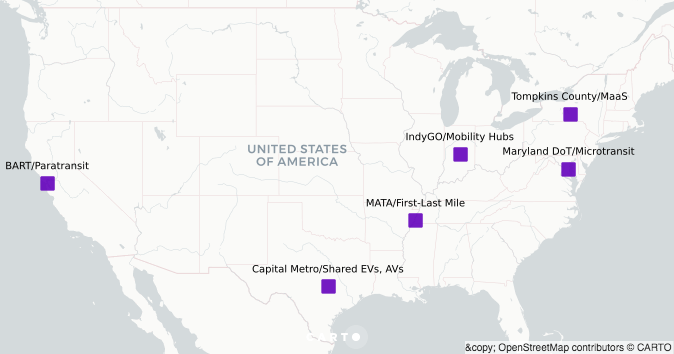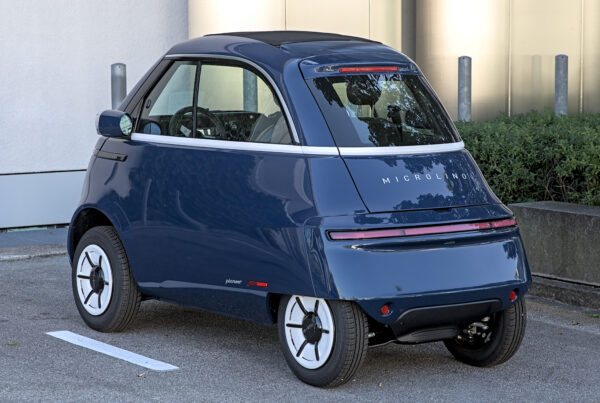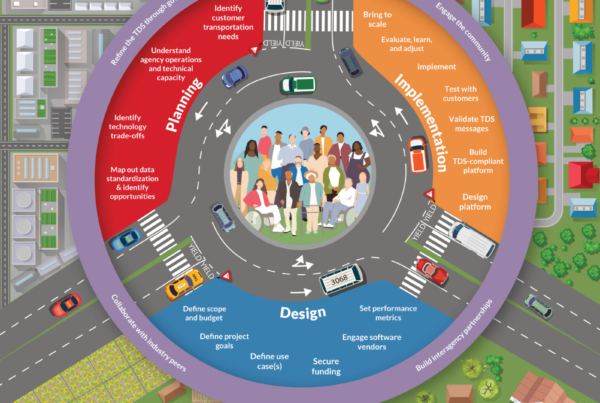Free technical assistance for MOD Business Plans
Six public transportation providers from across the country were selected this week for SUMC’s Mobility on Demand On-Ramp program. The On-Ramp, part of a partnership with the Federal Transit Administration, provides an opportunity for transit agencies with promising MOD concepts to receive expert assistance to build those concepts into workable projects. The selected projects came from a pool of nearly 30 applicant agencies from across the US.
The MOD On-Ramp Selectees
“We need to continue to innovate in public transit to find new ways to improve and expand transportation options for all. Shared mobility partnerships can test out new technologies and creative ideas that have the potential to improve customers’ rides and increase efficiencies for agencies. New pilots are one of the best ways to develop new service models,” said SUMC Executive Director Sharon Feigon. “We look forward to continuing our work with FTA and the selected agencies to help guide the critical early stages of their projects.”
“FTA is pleased with the level of interest, and the variety of ideas proposed in the MOD On-Ramp process,” said Vincent Valdes, Associate Administrator of the FTA’s Office of Research, Demonstration and Innovation. “This makes it clear that communities around the country continue to look to the Mobility on Demand concept as a viable solution to their mobility challenges. We look forward to working with the Shared Use Mobility Center to support the six selectees, learning from them, and sharing their learning with agencies around the country.”
Meet the Selectees
The selected projects represent a variety of project types, urban geographies, and agency sizes. These agencies will receive free technical assistance from SUMC as they develop their projects:
Capital Metropolitan Transportation Authority (Capital Metro, Austin, TX) is helping a rapidly growing region address the challenges of sprawl, congestion, and changing access patterns. They are examining shared, electric, and autonomous vehicles—what they term “smart mobility”—to connect to high frequency/high capacity transit service and to provide transportation for riders with disabilities.
Maryland Department of Transportation Maryland Transit Administration (MDOT MTA, Baltimore, MD) is developing a plan for microtransit to better connect high-opportunity job centers in the suburbs and low-income residential populations in the city.
Indianapolis Public Transportation Corporation (IndyGO, Indianapolis, IN) is developing strategic plans for integrated mobility hubs in a series of “mobility districts,” selected according to their urban typology. Each plan will focus on connecting hubs to their existing transit network.
Tompkins County (Ithaca region, NY) is a largely rural area contiguous with the Ithaca metropolitan area. The county, with a consortium of mobility operators, human service agencies, and mobility managers, is proposing a Mobility as a Service (MaaS) pilot, to both reduce solo driving trips and provide equitable transportation access to its residents.
Memphis Area Transit Authority (MATA, Memphis, TN) hopes to develop a demand-responsive service to transport riders from their doorstep to arterial routes in selected corridors of the city. The program seeks to improve service to both people in disadvantaged neighborhoods and paratransit riders.
Bay Area Rapid Transit District (BART, San Francisco Bay Area, CA) is aiming to create an on-demand wheelchair accessible vehicle (WAV) ride-hailing service. The rides would be staged at BART stations, and would provide either short, single-leg trips, or first/last mile trips to the stations.
Over the next year, the six agencies will work with SUMC and local partners to develop their projects, receiving support through the On-Ramp to:
- Conduct workshops in their communities to determine local mobility needs and set parameters for projects;
- Participate in a national community of practice with peer agencies and related experts as well as access to in-person workshops;
- Utilize research and analysis from SUMC and other experts;
- Collaborate one-on-one with peers and identify resources to meet challenges; and
- Develop a feasible MOD business plan.
As with SUMC’s FTA-supported Innovation and Knowledge Accelerator program, the On-Ramp will build a shared knowledge-base and accelerate learning on issues that affect the implementation of MOD projects and develop resources for use by the wider MOD field.
We look forward to sharing the lessons the we learn as we work with these innovative agencies, as they develop forward-looking mobility options for all transit users.




